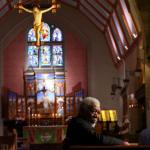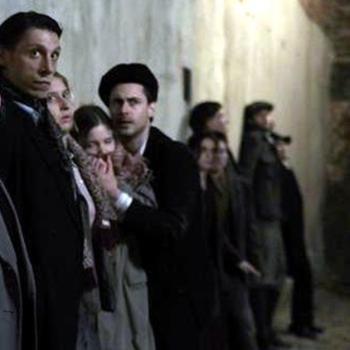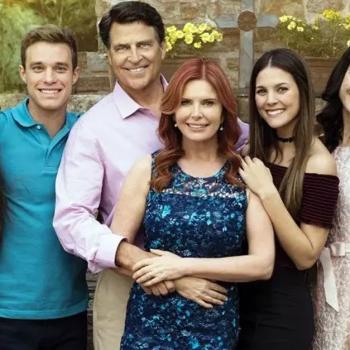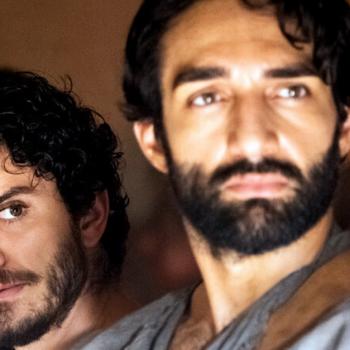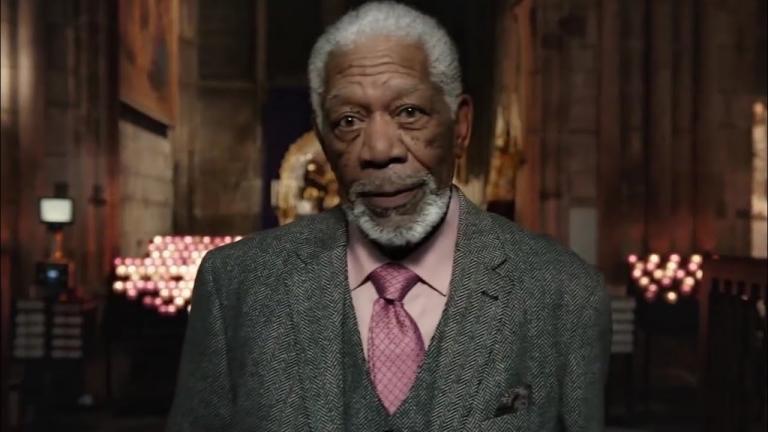
The Story of God With Morgan Freeman premiered its third season on Tuesday, March 5, on National Geographic Channel with an episode on the Devil. Next Tuesday, it’s Gods Among Us, profiling people who claim to be deities, including Jesus Christ.
The series sends host and executive producer Morgan Freeman around the world to survey a wide variety of belief systems, from major ones like Christianity, Judaism, Buddhism, Hinduism and Islam, to smaller sects. I’ve seen the first three episodes of this season. It’s an improvement over a disappointing season two, which followed a fairly strong season one.
Glad to report that, unlike in earlier seasons and many other cable documentaries, believers and clergy talk about Christianity, rather than primarily just academics, who, though they may study faith, are not always people of faith themselves.
Here’s how NatGeo describes Gods Among Us, airing Tuesday, March 12:
- Are there people walking among us who truly embody the divine? Many of us were taught that God is in heaven, yet we believe that it’s possible for people on Earth to have a direct connection to God. Christians think of Jesus as the epitome of the divine made human, but people of all faiths have sought God in charismatic figures. Morgan Freeman journeys around the world to explore the mysteries of these mortals, including a rare meeting with the famed Kumari of Nepal, a prepubescent living goddess.
One thing the episode doesn’t point out — and it’s what distinguishes Christ from others who claimed to be divine — is the Resurrection, the central mystery of Christianity. From the Catechism of the Catholic Church:
We bring you the good news that what God promised to the fathers, this day he has fulfilled to us their children by raising Jesus.”489 The Resurrection of Jesus is the crowning truth of our faith in Christ, a faith believed and lived as the central truth by the first Christian community; handed on as fundamental by Tradition; established by the documents of the New Testament; and preached as an essential part of the Paschal mystery along with the cross:
Or, as St. Paul wrote in 1 Corinthians 15: 12-19:
But if Christ is preached as raised from the dead, how can some among you say there is no resurrection of the dead? If there is no resurrection of the dead, then neither has Christ been raised. And if Christ has not been raised, then empty [too] is our preaching; empty, too, your faith. Then we are also false witnesses to God, because we testified against God that he raised Christ, whom he did not raise if in fact the dead are not raised. For if the dead are not raised, neither has Christ been raised, and if Christ has not been raised, your faith is vain; you are still in your sins. Then those who have fallen asleep in Christ have perished.If for this life only we have hoped in Christ, we are the most pitiable people of all.
Yet, Gods Among Us makes no mention of the Resurrection. Recently, during the biannual TV Critics Association Press Tour, I did a roundtable interview with host Morgan Freeman and his fellow Revelations Entertainment executive producers Lori McCreary (a Christian, by the way) and James Younger.
I asked them about the choice not to include the Resurrection, and here’s what I heard, with the producers considering the perspective of religions that include a belief in reincarnation..
Younger: [The Resurrection] is a splitting point for you, maybe, as a Catholic, but it may not be a splitting point for a Hindu, or a Buddhist, who are much more like, everyone gets resurrected. So, this issue about coming back from the dead is not really a big deal, because everyone does.
Freeman: Yeah, trying to reach Nirvana.
McCreary: You bring up good points. Because, we have a lot of things where we’re really careful about how we present information, because we know we have multiple faiths watching this. It’s important, and literally a word can make a difference.
We spend a lot of time … James, he sends notes in the middle of the night, “You can’t say this. Please say it this way.”
We find a way. I hope we find a way where we’re presenting something that’s not offensive to anyone who has a strong belief in one of these different faiths, but also allows them to lean in, as opposed to saying, “Well, they got that totally wrong.”
Here’s an exclusive clip from Gods Among Us, in which Freeman visits the Cathedral of Notre Dame and sees the Crown of Thorns, where the relic is kept. The priests share the history of the crown with Freeman, and he watches people from around the world come to experience it.
Here are NatGeo’s descriptions of the rest of the episodes:
Visions of God (March 19)
- Stories about visions of God are found in most religions, but where do visions come from? What do they have in common? Morgan Freeman sets out to explore the mysteries behind these visions, and his travels take him to Lourdes, France, where believers claim to have been cured of physical and spiritual ills by the water flowing from its spring. He also meets with a member of the Anishinaabe Tribe in Canada to learn about the transformative power of a vision quest.
Deadly Sins
- How do we grapple with the reality that we are all susceptible to sin? What Christians call “sin,” other religions describe with similar concepts, such as “karma” in Buddhism and Hinduism, or “guo” in Taoism. Morgan Freeman travels around the world to explore how different religions have developed ways to fight back against sin. He visits a local Hindu community in the United Kingdom to celebrate Diwali, and journeys to Vietnam, where he meets the commandant of the Hanoi Hilton, the notorious prison where the North Vietnamese kept prisoners such as John McCain during the war.
Diving Secrets (April 2)
- Some faiths keep their entire religious communities hidden for fear of persecution. Other faiths have secret practices that only special initiates are allowed to participate in. Morgan sets out on a journey to understand why secrecy and religion are so often intertwined, and if the mystery of ritual can bring people closer to the mystery of the divine. Along the way, he travels to the spectacularly preserved Villa of Mysteries in Pompeii to see frescoes depicting the secret cult of Dionysus, which is believed to have performed rituals of animal and human sacrifice.
Holy Laws (April 9)
- For many believers, the Ten Commandments are a moral guide and the foundation of Judeo-Christian and Islamic society. Around the world, other societies and religions also have divine prohibitions and prescriptions that the faithful must follow. Morgan Freeman travels to Jerusalem to meet with an archaeologist and examine a segment of the Dead Sea Scrolls, and crosses the globe to Nepal, where he explores the commandments of Jainism — the five great vows or Maha-vastras.
The Story of God airs Tuesdays at 9 p.m. ET/PT on National Geographic Channel.
Reprinted with permission from the Faith & Family Media Blog, copyright 2019, Family Theater Productions (original link here).
Image: National Geographic (screenshot)
Clip used with permission. Copyright 2019 National Geographic Channel/Revelations Entertainment.
Don’t miss a thing: head over to my other home, as Social Media Manager at Family Theater Productions; and check out FTP’s Faith & Family Media Blog, and our YouTube Channel.



